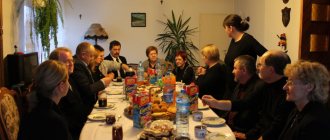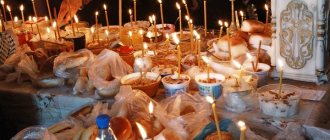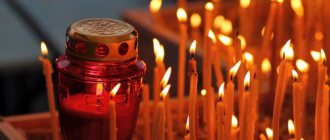All people come into this world and leave. This is a natural process of human life, everyone will have to die. The death of parents, children, friends always brings pain of loss and spiritual emptiness for many years. Funeral services for 9 days after death or after a funeral are carried out in compliance with centuries-old religious traditions. Joint meals of remembrance help to drown out the pain of loss, remember the good deeds of the departed, and pray for a better fate for the soul. It is customary to commemorate the dead on the 3rd, 9th, 40th days, as well as on each anniversary of death.
How is nine counted after death?
In order to organize and conduct a memorial event, it is important to accurately count the date. Not everyone knows how to count - 9 days from the date of death or from the date of the funeral. According to Orthodox canons, nine should be added to the day of a person’s death - this will be considered the date of commemoration of the deceased. If death occurred late in the evening or at night, then it must be counted accordingly from the next day.
Funerals cannot be organized or celebrated later than 9 days from the date of death. If it is not possible to hold a wake exactly 9 days later, then it is better to organize it earlier.
Is it possible to hold a funeral earlier or later?
If it is not possible to gather at the table on the 9th day after death, the memorial meal can be arranged a little earlier or later than this date. You can move the date of the funeral to the next weekend so that working relatives can attend. You can adjust the date due to fast days, if one of the invitees is not ready to eat only fast food. In addition, funeral tables are not set on the Bright Resurrection of Christ and the following Bright (holiday) week. Otherwise, the rules for holding nine days differ little from the rules that have developed for other commemorations.
What does the 9th day after death mean for the deceased and his relatives?
According to Christian dogma, after death, the soul of a deceased person leaves the body, but remains on earth for another 40 days. The soul remains in the house with its relatives for up to three days, then it appears before God, who, after certain tests, makes a decision about the fate of the soul.
On the ninth day after death, the soul of the deceased appears before the Lord for the second time. She will have to endure important tests, after which her future place of stay will be determined. That is why it is so important on the ninth day for the relatives of the deceased to sincerely pray and ask for a good life in the afterlife.
Days of remembrance in Christianity
When a deceased person has not yet crossed the border of eternity , relatives should try in every possible way to express to him signs of love and attention, to show respect. After all, a person is alive as long as they remember him. As part of a religious ritual, a Christian’s responsibilities include not only organizing funerals, but also organizing funeral dinners. They are attended by everyone who considers it necessary to pay tribute to the memory of the person who left us.
Day three
It is believed that on the 1st and 2nd days the soul of the deceased, together with the Angels, travels to all corners of the earth, remembering the main events of his earthly life that left an imprint on the soul, regardless of whether these memories are joyful or bitter. On the 3rd day, when relatives bury the body and perform the rite of remembrance (celebrate a wake), the newly departed soul is nearby and sad, forced to leave us on the third day.
Holy Scripture speaks of how in 3 days a person’s soul will travel through all the places close to the heart, visit dear people, for which it is given complete freedom, after which it will find peace from earthly affairs and will stop worrying about them. From this moment on, unfinished earthly affairs will be forgotten and only the upcoming ordeals will acquire significance. To do this, on the 3rd day the Lord will take the soul to Heaven so that it can prepare for the meeting with Him and with Justice.
The third day for those remaining on earth is the day of final farewell, and for the deceased - the day of the first meeting of the soul with the Lord God.
On day 3 accepted:
- perform a burial;
- order a memorial service at the church;
- before lowering the body into the grave, clean the house where the coffin was located for 3 days;
- arrange a funeral dinner.
9 days after death
What does this date mean?
After ascending to Heaven, the soul of the deceased is met by nine Angels . It is believed that now, for 9 days, nine angelic ranks, who are servants of the Heavenly Father, will be the defenders of the newly departed soul at the judgment of God. Only they can ask Him for high pardon for the deceased for earthly sins.
On the 4th day, the soul, with the assistance of the Angels, enters the gates of heaven and can contemplate all their extraordinary beauty. So the soul spends 6 days, forgetting the sorrow and pain that lived in it while still in the body. Seeing only goodness and self-love in the Gardens of Eden, the soul reproaches itself for the sins, voluntary or involuntary, that it committed during life. It turns out that 9 days are given to the soul not only to get rid of earthly suffering and pain, but also it experiences pangs of conscience and longs for repentance.
On the ninth day, Angels lead the soul to repentance. The second time the soul appears before the throne of the Lord God and experiences fear and trembling before it. That is why for nine days one must pray for God’s mercy on the soul of the deceased. After all, after repentance, the spirit of the deceased goes to contemplate the cruel torment of unrepentant sinners, that is, straight to Hell.
Nine days - when the first torment begins, associated with the fear of not falling into the highest order of God.
For 9 days accepted:
- order a church prayer for pardon for the soul of the deceased (requiem service);
- arrange a second wake with a meal;
- of the guests at the memorial, only relatives and those who remember themselves are present;
- mentioning as many good deeds of the deceased as possible at this meal will help his soul find mercy upon repentance.
In Orthodoxy it is believed that from the fourth to the ninth day after death the soul will see Heaven, and from the ninth to the fortieth day - Hell.
40 days
After a person passes away, the 40th day is considered very significant in the ritual of remembrance. And there is biblical confirmation of this:
- Prophet Moses observed a fast lasting 40 days, after which he received the tablets of the Covenant from the Heavenly Father on Mount Sinai.
- Jesus Christ, the son of God, ascended to heaven also on the 40th day after his resurrection.
- Moses wandered with the Jewish people through the Egyptian desert for 40 years in search of Palestine, the Promised Land.
- Another prophet, Elijah, walked 40 days to the sacred Mount Horeb.
In the Orthodox tradition, funeral bread and wine remain in the house of the deceased for 40 days. In some cases, you can see not bread, but a pancake, not wine, but water. These changes are not significant. The main thing is that in this way the news is transmitted to Heaven that the deceased is remembered and cared for. That all the souls of previously deceased relatives can come to this treat and also remember the deceased.
Having seen the torments of hell, the sinful soul during these 40 days descends to earth and hovers over the grave, its home, this is called ordeal. She asks to forgive her all her sins, because she does not want to go to hell, which she saw. During these days, all her sins must be forgiven, because, having realized everything, she silently asks everyone about it. And this must also be done (forgive the deceased) in order to prevent him from returning to earth in a sinful form. So that he returns clean and immaculate.
On the 40th day, the soul returns to Heaven and the Angels lead it to God for the third time at the Last Judgment. Then the final fate of the sinner or the righteous is decided. According to repentance, the soul is assigned a place in Heaven or Hell. It is during this period that one must pray for the restless soul of those who remained on earth, and especially ask for forgiveness before the Lord for his earthly sins, because these prayers are taken into account and make amends for the guilt of the deceased, which is a pass to Paradise. And the joining of the soul to the face of the Angels will allow the deceased to become a fervently praying, guardian angel.
Forty days is exactly the line that separates eternal life from earthly life.
For 40 days accepted:
- go to the cemetery;
- order a memorial service;
- collect a funeral table;
- but drinking alcohol is prohibited.
Once 40 days have ended you can:
- remove mourning decorations;
- take funeral water, pancakes or bread to the grave;
- open mirrors and windows;
- remove the deceased's belongings from the house;
- decorate and clean the grave.
The soul is closely connected with the earthly world all 40 days after death. Those who have lost loved ones know what this concept means. It often seems to relatives that after the funeral someone’s invisible presence is still felt in the house. This is precisely what is associated with the custom of covering glass and mirrors. Some pagan beliefs claim that the soul can get lost in mirrors and not find its way to Heaven.
Many people who have recently lost relatives have said that they have had dreams in which they saw deceased relatives coming to them to say goodbye. And also quite a few people admitted that they heard the presence of the deceased in the house for up to 40 days, his smell, steps, creaks and breathing. In Christianity, these visions are considered superstition.
How to pray in a cemetery for the deceased
On nineteenth day, believers must visit the cemetery. They clean up the grave of a deceased relative, remove garbage, and lay flowers at the gravestone. If possible, you can invite a priest who will read prayers and conduct a funeral service. Everyone present at the cemetery should read prayers, thinking only about the salvation of the soul of the deceased. At this time, you need to completely renounce your life problems.
Behavior in church
A visit to a temple or church on the occasion of commemorating the deceased on nine days is mandatory for Orthodox people. After coming to the temple of God, you should perform a series of sequential actions:
- go to one of the icons, near which there are candles for the repose, and cross yourself;
- You need to buy a candle in the church shop, then light it from the other burning candles. If there are no lit candles, then you can use a lamp. You cannot light your own lighters and matches in church;
- place a candle in front of the icon; for stability, you can melt its lower edge;
- sincerely ask God to rest the soul of God’s servant (state his full name);
- cross yourself, bow to the face of the saint, and step aside.
While in church, you cannot talk loudly or discuss business. All thoughts should be directed only at the deceased and turning to God.
Perception of death
In Orthodoxy, death does not mean the end of life, it is only a transition from one state to another, from earthly life to life beyond it. When a person is born, he begins his journey, but does not end it with death, because the soul is immortal. Therefore, it is important to fill it with good and righteous deeds in order to give the soul a chance to end up in heaven for eternity and not in hell. The teaching of Christ assures believers not to be afraid of death, but to expect it humbly, submitting to the will of God - as long as God has prepared to live on earth, so much will be enough. It turns out that there is no end, and earthly life is just a moment compared to the eternity that the soul will spend after the death of mortal flesh.
How to properly set a funeral table
The customs of commemoration on the 9th day after the funeral oblige relatives to organize and hold a dinner in a special way. The event can be held at home, as well as in one of the cafes or restaurants. Now many catering establishments specialize in funeral dinners.
People are not invited to the funeral. If they want to remember the deceased, they come themselves. During the meal, all those present must pray for the repose of the soul of the deceased, and also taste special memorial dishes. At funerals it is customary to serve kutya, jelly and pancakes. Each dish is symbolic. In addition, other modest and simple dishes are prepared for lunch: borscht, cutlets, fish, salads, pastries.
If the funeral takes place during Lent, then there should be no dishes made from animal products on the table.
What are the prayers for memorial days?
The deceased does not need a beautiful and expensive coffin, exquisite dishes on the funeral table, and even less alcohol. He needs our spiritual support. That is why it is very important to pray for him these days and order prayers:
- Requiem service - it is important to order this ritual for 9, 40 days and anniversaries; subsequently the requiem service is held on Saturdays.
- Sorokoust is a funeral Liturgy, a special rite symbolizing the washing of the soul by the blood of Christ.
- Psalter for the repose - psalms are read in monasteries and special prayers for them, they can be ordered for a year.
When conducting rituals, personal prayer is also necessary, into which you must put all your faith, feelings and respect for your departed loved one. When praying, you need to light candles and write memorial notes. It is very good to submit notes in monasteries, where true righteous people will pray for the soul of the deceased.
But you need to pray for the deceased not only for forty and nine days after death, it is worth remembering him and holding a church ceremony on the anniversary. After all, birthdays are no longer celebrated after death, but only annual commemorations are made on the day of the onset of eternal life.
Does the type of clothing matter?
After burying the body of the deceased, close relatives are required to wear mourning clothes, if possible, for up to 40 days. Everyone who comes to bury and then commemorate the deceased should be dressed modestly, in dark dresses or suits. The Orthodox Church says brightly colored clothing should not distract people from the main memorial event.
During the wake, it is customary to read prayers, so women should have their heads covered. On the contrary, the male part of the guests present should be without hats. Women wear scarves only in black - this shade means grief.
What items are distributed at wakes for 9 days?
Since ancient times, it has been customary to distribute food and items at funerals. The remaining food from the funeral table is given to guests or taken out to people in need. It is also customary to serve sweets and cookies at the cemetery so that people remember the deceased with a kind word.
There are rules on the 9th day after the funeral to distribute dishes, towels, headscarves and handkerchiefs to those present at the meal. According to ancient superstitions, dishes are capable of accumulating negative energy, so items from which guests ate should not be taken. Distribute pre-prepared clean forks, spoons or glasses. Woven products serve as a symbol of memory of the deceased.
Rules of behavior at funerals
You shouldn’t throw a luxurious feast at a wake that boils down to gluttony. You cannot turn a funeral meal into a merry feast. But you shouldn’t indulge too much in grief. It is best if the funeral words are spoken quietly at the table, if the memories of the deceased person are kind and bright. To help the soul and not harm it, priests advise starting and ending the meal with a common prayer. It is important not to remember under any circumstances the bad deeds or harmful character of the deceased.
Why is it commemorated on 9 and 40 days after death?
If nine days have passed since the funeral, the clergy will tell you what to do for believers. The church regularly holds funeral services and magpies. Memorial services help the souls of the deceased enter heaven.
Days 9 and 40 have special significance for believing loved ones of deceased people. Only on these days does the Lord establish his afterlife fate. From the third to the ninth day, angels accompany the soul through the heavenly abode. According to biblical scripture, on the ninth day the soul meets the Almighty. The next thirty days there is a journey through hell to see the suffering of the martyrs in hell. It is on the ninth day that it is so important for family and friends to devote a lot of time to prayers and requests for a better fate for the deceased. On the forties, the Almighty determines the last refuge for the soul, and it leaves the earth forever.
Is it possible to go to a cemetery for 9 days?
Theologians believe that if possible, it is not only possible, but also necessary to go to the cemetery on this day. The superstition that on the 9th day after death, visiting a cemetery can somehow harm the soul of the deceased or his relatives is just a harmful misconception that has nothing to do with the Orthodox Church. However, you shouldn’t worry if you can’t come to the grave on that day. It is important to remember that the most important thing for the soul of the deceased is the prayers of his family and friends, which can be offered not only in the cemetery, but also in church or in private (at home). Usually on the 9th day, the grave is cleared of accumulated debris, lamps or candles are lit and prayers are read. You can invite a priest to conduct the litia. Or, if for some reason this failed, it is worth reading the lithium for the laity yourself. If there is no intention of going to the cemetery on this day, such a litiya can be read privately, at home, before the funeral meal.
Flowers are most often brought to the cemetery. It is better not to leave food at the grave. If you want to distribute it to the poor, it is better to give it directly into the hands of needy people. Or put it on a special funeral table in the church. On the way to the cemetery, you can distribute funeral treats to people you meet, consisting of sweets, pies, cookies, gingerbread, etc. At the same time, the name of the newly deceased is called and asked to be remembered in his prayers.
A lit lamp cannot be left on the grave so as not to cause a fire.
Tithes in commemorating the deceased are extremely important.
The funeral table set on this day means that all the relatives and friends of the deceased gathered at the meal not only remember him, but sincerely strive to help him. A memorial service ordered in a church, the prayers of relatives and friends warm the soul of the deceased. They support her in the difficult trials and ordeals that come after the 9th day, help her to cleanse herself of sin and go to heaven. Do they not go to the cemetery for 9 days?
Basic mistakes and rules
Commemoration of the dead must be carried out in accordance with established religious dogmas. Orthodox and Muslims try to honor established customs in order to ease the fate of the person who has left this world. It is important to know how to celebrate 9 days - from the moment of death or funeral.
Commemoration of the deceased should be held at a modest table. Food should not distract those present from prayers and turning to God. Women should not buy a new dress or visit a hairdresser. Funerals and commemorations are not the events when you need to pay attention to your appearance.
The commemoration should take place in an atmosphere of general grief and sadness. There should be no swearing or loud statements. You should not talk about extraneous topics. All time should be devoted to quiet conversations about the deceased and prayers for him. Alcoholic drinks are not welcomed by Orthodoxy. Everyone knows the negative consequences of excess libations. The funeral should be celebrated at home or in a cafe, but under no circumstances in a cemetery.
All religions have their own funeral traditions, which are sacredly observed from generation to generation. Every person suffers when they lose loved ones, so they want to alleviate the mental pain as much as possible. Rituals of remembrance help not only to quickly cope with sadness, but also to ease the fate of the soul of the deceased in the next world.
How to look right on this day.
- They come to the cemetery clean. It is advisable to take a shower or bath to avoid any foreign odors. This way you will express your respect for the deceased. After the cemetery, it is also better to wash off the dust, the effects of dead energy, and negative emotions.
- Don't embellish yourself. Makeup and perfume are unnecessary. After all, this is a tragedy, not a holiday. The dead may take offense at the lack of empathy for their plight. The deceased don’t try to please them so that they don’t take you to the next world. They come for the deceased himself, and not to show off.
- You should not pin your hair with anything. Hairpins and pins are not welcome on the premises of the deceased. As a last resort, tie it into a ponytail with a simple elastic band. But straight, flowing hair is best.
- The clothes are strict and simple, in dark colors. Pants (jeans in extreme cases), jackets, and long skirts below the knee are perfect. You can wear gloves and a veil. It is better to postpone shorts until more suitable events, even if it is very hot, because it is disrespectful to the deceased.
- Closed shoes. Flip flops and slippers are not acceptable in the cemetery.










